|
|
|
|
|
|
|
|
|
|
|
|
|
 |
 |
 |
 |
|
 |
 |
|
|
Cub Scouting is FUN
Scouting is fun with a purpose! And that purpose is to raise boys who respect themselves, respect others, and who have strong character. There is no better youth leadership nor community service training than Scouting. Cub Scout Pack 22 is in Bradenton, Florida, and we are dedicated to providing a fun Cub Scouting experience for all boys from 1st through 5th grade. Cub Scout Pack 22 runs a year-round program uniquely designed to meet the needs of young boys and their parents. Our program offers fun and challenging activities that promote character development and physical fitness. Service projects, ceremonies, games, and other activities guide boys through the core values and give them a sense of personal achievement. Through positive peer group interaction and parental guidance, boys also learn honesty, bravery, and respect. Family involvement is an essential part of Pack 22's Cub Scouting program, and parents are required to play an active role in our Pack as Leaders, Chairs and Event Helpers. Through interaction between parents, leaders, and friends, boys learn citizenship, compassion, and courage. This family-and community-centered approach to learning means that Cub Scouting is truly time well spent for your sons! 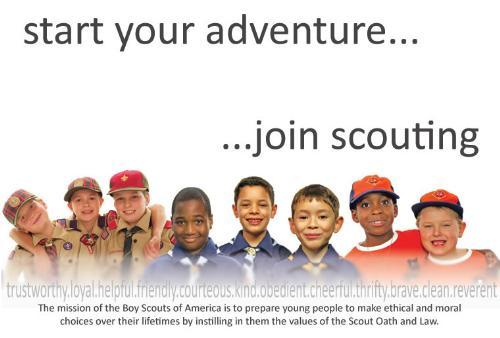 BSA's "Be A Scout" Videos LinkBSA's "What Is Cub Scouting?" LinkBSA's "Welcome to the Adventure of Cub BSA's "Be A Scout" Videos LinkBSA's "What Is Cub Scouting?" LinkBSA's "Welcome to the Adventure of Cub
Scouting" PDFBSA's Overview of Cub Scouting LinkBSA's Purposes and Methods of Cub
Scouting LinkBSA's Frequently Asked Questions Link
Cub Scouting's 12 Core Values
- Citizenship: Contributing service and showing responsibility to local, state, and national communities.
- Compassion: Being kind and considerate, and showing concern for the well-being of others.
- Cooperation: Being helpful and working together with others toward a common goal.
- Courage: Being brave and doing what is right regardless of our fears, the difficulties, or the consequences.
- Faith: Having inner strength and confidence based on our trust in God.
- Health and Fitness: Being personally committed to keeping our minds and bodies clean and fit.
| - Honesty: Telling the truth and being worthy of trust.
- Perseverance: Sticking with something and not giving up, even if it is difficult.
- Positive Attitude: Being cheerful and setting our minds to look for and find the best in all situations.
- Resourcefulness: Using human and other resources to their fullest.
- Respect: Showing regard for the worth of something or someone.
- Responsibility: Fulfilling our duty to God, country, other people, and ourselves.
| BSA's Character Development Link Cub Scout Ranks
 |  | | | Bobcat | Starting Cub Scouts: (must be at least in the first grade or 7 years old) | | 
| Each boy who joins the Cub Scouts will first earn the Bobcat badge. The boy must do his best to learn several things, including the Boy Scout Oath and Law, handshake, and salute to name a few. The Parents must read and discuss with the boy a pamphlet on preventing child abuse. The pamphlet can be found in the front of each Cub Scout handbook. When the boy has completed each step to the best of his ability, the parent can sign it. The scout will receive his badge at the next Awards Ceremony during one of our Pack Meetings. | | Tiger | Tiger: (members of the Tiger Den) | 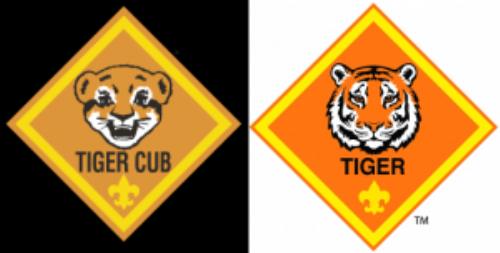 | First grade boys, or those who are at least 7 years old, will work toward the Tiger badge after first earning the Bobcat badge. The Tiger badge is for boys who have completed all required Adventures in the new Cub Scout program. An Adult Partner, usually a parent, will attend meetings and work with the Tiger to complete the corresponding handbook. Once completed, the Adult Partner will sign the handbook and receive the Tiger badge. The Adult Partner will then present the badge to the Tiger. The scout will receive his badge at an Awards Ceremony during one of our Pack Meetings or at Crossover in May. | | Wolf | Cub Scouts: (members of the Wolf Den) | 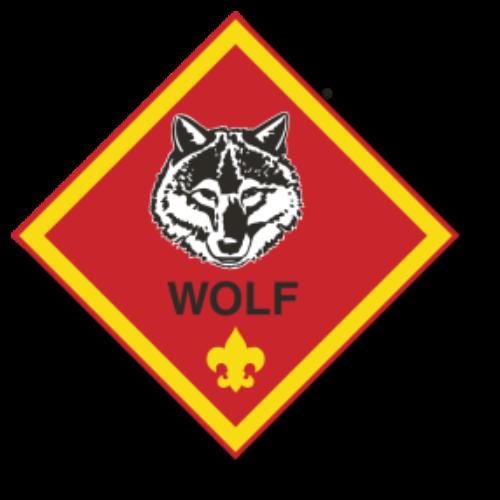 | Second grade boys, or those who are at least 8 years old, will work toward the Wolf badge after earning the Bobcat badge (if it hasn't been earned already). All required Adventures in the new Cub Scout program must be completed. All requirements are age appropriate. When the Scout has done his best to complete each requirement, a parent or Scout Leader can sign it off. The scout will receive his badge at an Awards Ceremony during one of our Pack Meetings or at Crossover in May. | | Bear | Cub Scouts: (members of the Bear Den) | 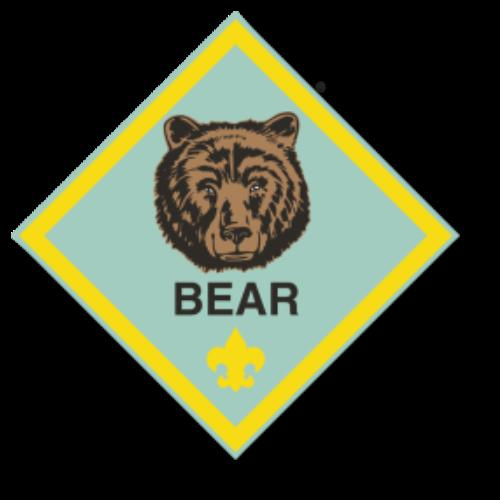 | Third grade boys, or those at least 9 years old, will work toward the Bear badge after earning the Bobcat badge (if it hasn't been earned already). All required Adventures in the new Cub Scout program must be completed to the best of the Scout's ability in subjects similar to the Wolf badge but slightly more challenging and varied. Again, a parent or Scout Leader can sign requirements off as they are completed. The scout will receive his badge at an Awards Ceremony during one of our Pack Meetings or at Crossover in May. | | | Webelos Scouts: (members of the Webelos Patrol) | | 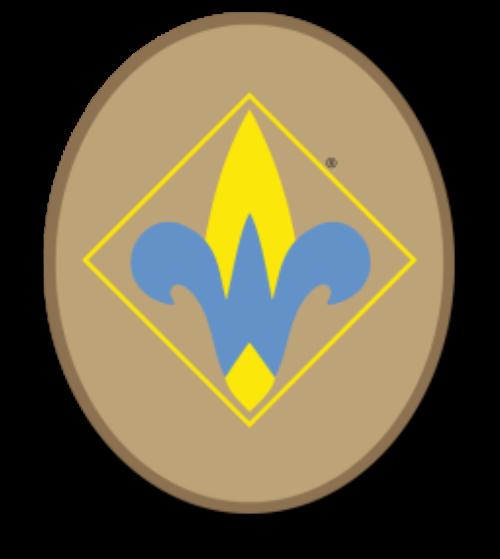
| Fourth graders, or those at least 10 years old, will be Webelos Scouts. After earning the Bobcat badge (if it hasn't been done already), Webelos Scouts work on their Adventures in the new Cub Scout program. The Webelos badge is earned by completing the required Adventures. Webelos are a transition period, preparing the boys to become more independent workers and thinkers, and eventually a Boy Scout. The scout will receive his badge at an Awards Ceremony during one of our Pack Meetings or at Crossover in May. | | | Transitioning from Cub Scouts to Boy Scouts: |  | The Arrow of Light year is for 5th graders who are prepared to become Boy Scouts. Under the new Cub Scout program, boys can join scouts at this level, having never been a scout before. (The Bobcat Badge must be completed first if not done already.) Arrow of Light is the highest award a Cub Scout can earn. | BSA's The Advancement Trail Link BSA's Mechanics of Advancement: In Cub Scouting Link | |
Scout's Advancement, Achievements and Awards
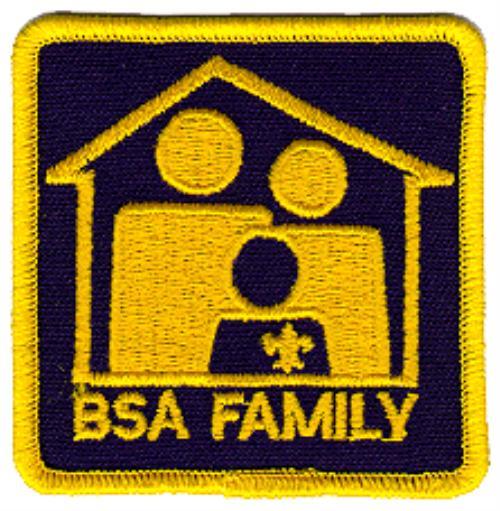 | The Cub Scout Advancement program follows the school grade levels and aims to introduce new skills and areas of interest as well as to build self-esteem, self-awareness and a sense of citizenship and good sportsmanship. Family involvement is crucial to achieve the advancement of the Scouts, and responsibility for advancement in rank rests with the parents; verification and assistance of the Den Leader is secondary. | - Tigers: (1st grade) work toward their Tiger Cub badge and earn belt loops by participating in adventures. Belt loops are awarded for participation to enhance the Tiger Program and ease the way into Cub Scouting.
- All other Cub Scouts earn the Bobcat rank first and later the rank appropriate for their age level.
- Wolves: (2nd grade) earn the Wolf rank by earning belt loops by participating in adventures.
- Bears: (3rd grade) earn the Bear rank through earning belt loops by participating in adventures.
- Webelos: (4th grade) earn the Webelos rank and also earn belt loops for adventures.
- Arrow of Light: (5th grade) earn the "Arrow of Light," the highest award that can be earned by a Cub Scout.
- The parent can sign off on Tiger, Wolf, and Bear advancements; Webelos advancements are signed by the Den Leader.
Youth Protection Training and Two-Deep Leadership
BSA (Boy Scouts of America) and Pack 533 takes Youth and Adult Safety very seriously! - Preferably both parents from each family must take YPT (Youth Protection Training) once every two years.
- All adult volunteers Pack 22 Leadership must take YPT (Youth Protection Training) first before becoming a Leader of Pack 22.
- All volunteers must take YPT (Youth Protection Training) at least once every 2 years. Turn in the passing certification printout to our Secretary.
BSA's Youth Protection Link
Two-Deep Leadership (YPT): is never leaving a child, girl or boy, alone with one adult at any time for any reason whatsoever!
We as Pack 22 Leaders will always interact with your kids only when there is another adult within eyesight. Even when Pack 22 Leaders take a Scout aside to talk to him privately out of hearing range, we must do so within eyesight of another adult.
Pack 22 encourages all adults to help us keep order during Pack 22's events and activities. As members of Pack 22, parents understand that other adults, not just Pack 22 Leadership, may ask their any child not just scouts to behave if it is necessary. Adults should give kids a gentle verbal warning first and inform their parents if the child does not correct his or her behavior. If the bad behavior continues, then Den Leader will be informed. The Den Leader may ask the mis-behaving child, boy or girl, to set out of Pack 22's activities in "Time Out" for a short period of time. If the bad behavior continues then it will be reported to the Cubmaster. The Cubmaster and Pack Committee may take further actions by asking the family to leave our Pack.
At no time should a child, boy or girl, be alone with any adult unless that adult is their very own parent, guardian, or family member like a grandparent. Additionally, on overnight camping trips, kids must sleep with their family in their family's own tent. Kids are not allowed to sleep in another family tent even if that family is a close friend of the child's parents.
BSA's Youth Protection, Adult Leadership and Two-Deep Leadership Link |
Cub Scout Ideals | |  | | 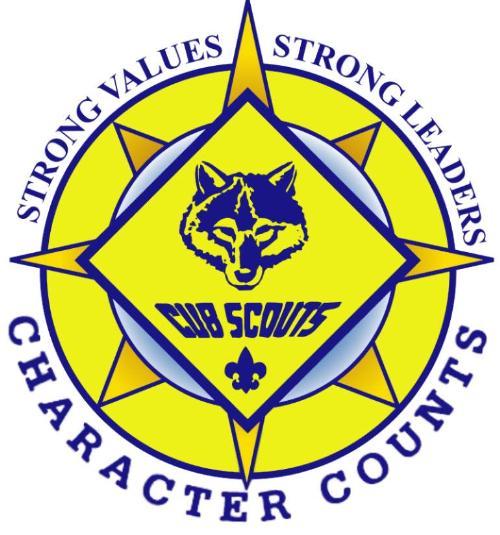 | Boy Scout Oath (or Promise): - On my honor I will do my best
To do my duty to God and my country
and to obey the Scout Law;
To help other people at all times;
To keep myself physically strong,
mentally awake, and morally straight. Boy Scout Law: - A Scout is trustworthy, loyal, helpful, friendly,
- courteous, kind, obedient, cheerful, thrifty,
- brave, clean, and reverent.
Cub Scout Motto: Tiger Motto: |
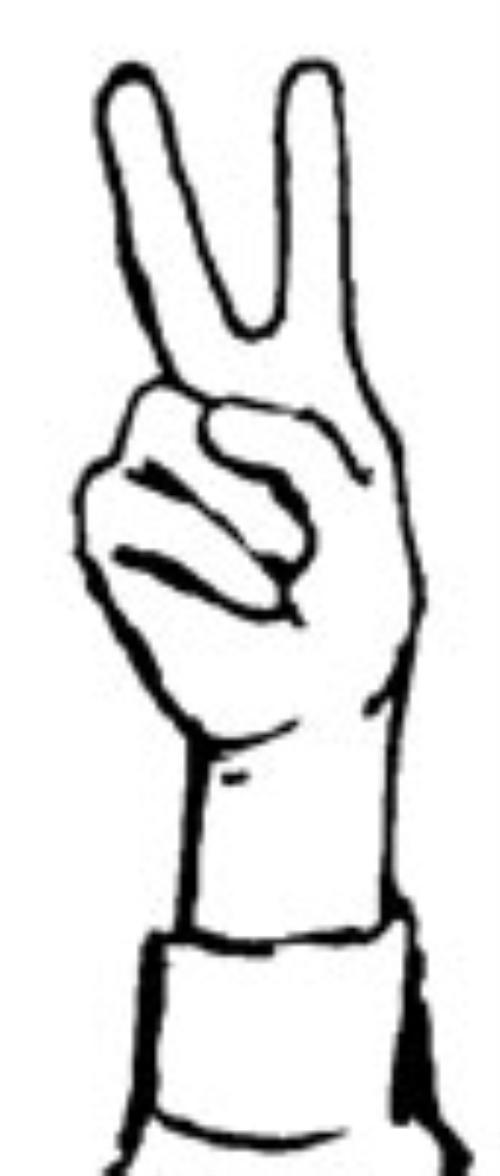
The Cub Scout Sign:
The Cub Scout sign is made with the right arm held high and straight up above the shoulder, with the index and middle fingers forming a V. The other fingers are held with the thumb.
The two extended fingers stand for the parts of the Scout Oath, "to help other people" and "to obey." They also stand for the two alert ears of a wolf. This is the sign of Cub Scouts all over the world.
The Cub Scout sign should be given when repeating the Scout Oath and Law. It is also used in ceremonies to let everybody including parents, siblings and guests to quite down and pay attention. | | | The Cub Scout Handshake: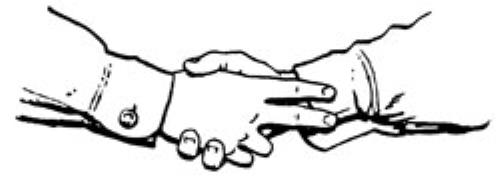 The handshake is done by putting the index and middle fingers of the right hand against the other person's wrist when shaking hands. Cub Scouts and Cub Scout leaders use this handshake everywhere in the United States. The handshake signifies that those who use it help others and obey the Law of the Pack. | | | 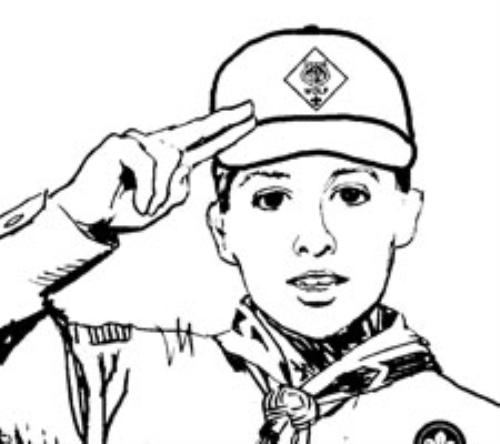 The Cub Scout Salute: The Cub Scout Salute:
The salute is made by joining the index and middle fingers of the right hand (holding the other fingers with the thumb) and touching the extended fingers to the cap visor or forehead. The hand is held the same as for the Cub Scout sign, except the two fingers are together.
The Cub Scout salute is used to salute the flag when in uniform and to show respect to Den and Pack Leaders. It can be used when greeting other Cub Scouts.
|
BSA's Cub Scout Ideals Link BSA's Purposes and Methods of Cub Scouting Link
Glossary
Pack: The whole group - all of our dens and families together is called a Pack. The Pack usually meets once every month.
Den: The Den is a group of Cub Scouts who meet at regular intervals. Typically a den consists of 6 to 10 boys of the same grade who are all working toward the same rank.
Pack Meetings: The pack meeting is a monthly gathering of all the Tiger Cub, Wolf, Bear and Webelos Scout dens in the pack, along with their families, for recognition, fun, and program. It is where the rank advancement ceremonies take place. Each pack meeting follows a theme, and is tied into Cub Scout's Core Values.
Den Meeting: Individual Den Meetings are held for each rank level of Cub Scouts. Den Leaders will set up a schedule of meetings, usually one or two a month.. Tiger, Wolf and Bear dens work on fun projects, crafts, skits, and their achievements towards earning their ranks. Webelos dens use this time to work on the various Activity Badges.
Pack Committee: The governing board of the Pack consisting of parents who volunteer to help make decisions on behalf of the Pack.
Pack Committee Member: A parent who serves on the Pack Committee.
Committee Chair: The Committee Chair is an adult volunteer that oversees the Pack committee.
Cubmaster: The Cubmaster is an adult volunteer leader and is responsible for monthly pack meetings, the program of the pack, and the operation of the dens.
Assistant Cubmaster: An Assistant Cubmaster is an adult leader who assists the Cubmaster with the pack program and may run the Pack in the absence of the Cubmaster. Our Pack currently has one Assistant Cubmaster.
Den Leader: A Cub Scout Den Leader is an adult volunteer who leads a Cub Scout den, with the help of assistant Den Leaders and parents. The Den Leader typically organizes and runs the den meetings and field trips, and also oversees the boy's advancement.
Den Chief: A den chief is a Boy Scout who serves as an assistant, helping the Den Leader with the den and providing fun and interesting things for the boys to do.
Cub Scout: A Boy Scout is between the ages of 7 and 10 and belongs to a Den. Cub Scouting furthers the development of the boy through camping, outdoor activities, skills development, and advancement.
Cub Scout Rank: The Cub Scout advances through these ranks: Tiger, Bobcat, Wolf, Bear, Webelos I and Webelos II.
Achievements: The required activities for earning the Wolf or Bear Badges.
Electives: The optional activities used by Wolf and Bear Cub Scouts to earn arrow points.
Webelos: is an acronym of WE'll BE LOyal Scouts.
Webelos Activity Badge: An award for having completed the requirements for one of the twenty Webelos Activity areas.
Akela: Akela is the Cub Scout term for a leader - any leader - including Den Leaders, Cubmasters, teachers, parents, and any other adult the Cub Scout looks up to.
Pinewood Derby: Pinewood Derby is an activity for all Cub Scouts and Webelos Scouts. Boys build wooden race cars with adult assistance and race them down pinewood tracks for prizes and trophies. This is a Scout favorite as this is one of the most exciting events of the year!
Blue and Gold Banquet: This is an event that is held every February to celebrate Scouting Anniversary Week. At the banquet we celebrate the Pack's anniversary, host a Friends of Scouting presentation, and have entertainment provided by the dens, as well as a theme related to the meal.
District Roundtable Meetings: The Manatee District holds a monthly Roundtable meeting for all of its Boy Scout and Cub Scout leaders. The purpose of Roundtable is to help units succeed by providing useful program ideas, information on policy, leadership training, and current information on upcoming Council events and training opportunities. Roundtables are where the Pack and Troop leaders find out what's going on!
BSA's Glossary of Scouting Terms PDF | | |
|
 |
 |
|
 |
 |
 |
 |
|
|
|
|
|
|
|
|
|